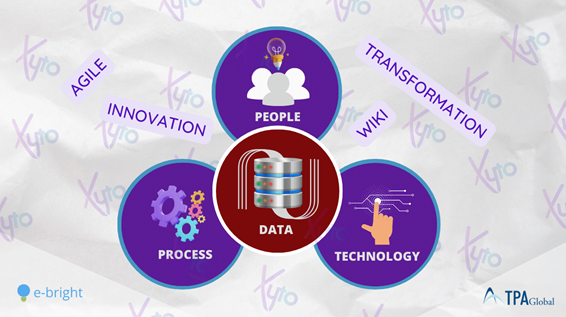Cliché Busting: The Substance Behind the Sound Bites
Part 4 of 5: Key Concepts in the Future of Tax
There’s a saying that goes, “technology requires tax to upskill, but transformation requires tax to reskill“. For those that follow this series, it will be no surprise that we fully subscribe to this.
Of course, we don’t mean that current skills must be forgotten, but the impact of digitalization is so pervasive that shortly – if not already – every aspect of tax will be in a state of flux.
One of those aspects, a critical one, is how industry knowledge is managed. In addition to general tax skills & knowledge, in-house tax professionals must add tribal knowledge – that is, all the hard-won wisdom around their organization’s own tax footprint.
But, even that is not the end of it. Progressive in-house tax departments are taking on the challenge of understanding how that tax footprint is represented in the company’s enterprise systems, taking the reins of control for themselves through tax engines and other digital tools. This is a vital part of tax’s in-house value proposition going forward, a point we have stressed throughout this series.
The consequence of all this is that mountains of new & up-calibrated information, intelligence, and knowledge are being generated. As an example, tax departments looking to become full business partners & digital co-pilots at their companies will need to acquire good levels of competency in:

Note that collectively, we call this taxology, and persons well-versed in these competencies for the tax industry specifically are taxologists.
But in reality, this list is a subset, and anyway none of it works very well if not within the context of transformed mindsets and new ways of working. In fact, at this point we feel we should issue a gentle word of warning:
“The idea that tax technology & digitalization should be natural for existing tax professionals because, after all, it is still just ‘tax’, is a false one. Experience shows that tax professionals are ‘surprised’ and unfamiliar with the impact of technology, and typically overspend and/or end up with solutions not fully fit for purpose. The time for learning by trial ‘n’ error has passed.”
What is natural, however, is for tax to be deeply impacted by technology, and particularly – at risk of overstating the obvious – information technology, or “IT”.
If tax departments were factories, they would have one input, raw data, and one output, information – that is, data with business relevance imparted to it. This is the root of tax’s value proposition, so if “IT” means putting information on steroids through the use of powerful technologies, then tax is perfectly positioned to profit. For this reason alone, it should be welcomed with open arms by the industry.
Lastly, not every tax department is at sea with technology. An increasing number have managed to acquire IT skills in some form and now partake in the broader corporate digital alchemy. This is great as far as it goes, yet nearly all suffer from:
Key person risk – highly reliant on a few individuals who can do it
Digital skills succession – informal and little or no notion of how to make them a permanent, embedded feature of tax with genuine career paths.
Consequently, this cannot yet be called a truly transformed state as the tax function has yet to redefine itself by digital-age capability. Also, you cannot assume that once the system is configured that everything is fine, and let all the knowledge reside in the heads of a few persons who cannot explain it to others.
So, how is this resolved?
Towards a Solution
As with the rest of this series, the challenge is not new and others before tax have faced the same challenge – that is, an information & know-how explosion. As such, knowledge management is already a major focus area in general.
Tools like the internet and email revolutionized the communication & dissemination of information, but it was search & tagging that brought meaning to the content. Early in-house attempts were collectively called ECM, or enterprise content management, but these were mostly half-hearted and largely ineffective.
At Xyto, as always, we are only concerned with meaningful answers and found that wiki-style knowledge management is the right approach for tax. To make that realizable, we are introducing a Tax MetaBase to capture, refine, and share new-age tax knowledge. The “meta” refers to the fact that it contains information about the information – or metainformation – that make up digitalized tax landscapes.
It follows the principles used by Wikipedia, the world’s largest online encyclopedia, and early customer experience has revealed two important knock-on benefits:
Creating the Tax MetaBase itself was an immense learning experience even for highly experienced tax professionals, and
Portions of it are common to all tax functions in terms of some areas of tax, knowledge acquisition methods, and technology – SAP, Oracle, Vertex, etc.
Consequently, we have been able to put together a Tax MetaBase Prototype, which offers a big head start on this highly challenging undertaking. After all, international tax by its very nature is vast & highly complex, never mind trying to capture & explain the details of its digital manifestation as well.
However, like the concepts in Parts 1-3, this works best within a transformed state, but even here we found a mutually beneficial effect at work – namely, that a Tax MetaBase helps foster transformative journeys, which in turn are greatly improved by the Tax MetaBase – a.k.a. they strongly reinforce each other.
So, What Does This Mean For You?
Firstly, it means that we can explode the myth that digitalized tax cannot be written down & shared. Of course it can, and while it takes some extra effort to start, the long-term benefits are incalculable. In fact, they’re hard to imagine at the outset, as one of our customers – a graduate of Smart Tax Technology – told us:
“At the beginning, I only understood 5% of what we are now achieving.”
Secondly, well, forget secondly for now. It’s easier to show you, so why not Contact Us for a Tax MetaBase demo. You won’t be disappointed.
In Part 5, the final one in this series, we explore why this or any of Parts 1-4 will lack meaning & value unless people & corporate cultures begin opening up and start to relinquish their addiction to the “pre-digital + automation” mindset.
Taxology Part 1: Why Agile Matters
Key Concepts in the Future of Tax – A five part series
In one sense, taxology is about excellent delivery of tax technology with built-in digital future-proofing.
Xyto and partners are all about realizing both for the price of one, such that…
Their combined value is far greater than the sum (cost) of their parts.
But how? … Well, it’s no big mystery and we’ve nothing to hide.
We simply run journeys that unshackle the most powerful concepts already available today!
The associated sound bites are not new and many in tax have heard of them, yet they remain curiously out of reach.
This 5 part series looks at the truth behind five critical keywords that tip the balance towards success when tax embraces digitalization.


No comment yet, add your voice below!